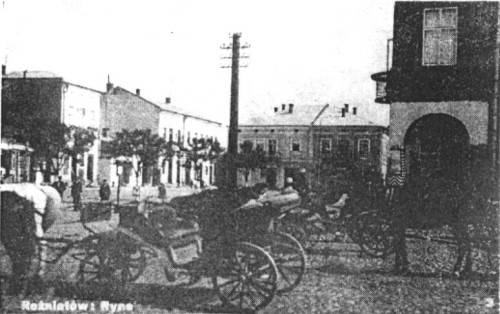 |
|
{65}
Reb Bendet Elimelech received great encouragement from the Chovevei Zion of Galicia, and in response to a special request from the chairman of the central Ahavat Zion organization in Tarnow, Dr. Avraham Zaltz, he authored an explanatory pamphlet about the Chovevei Zion idea, and the idea of physical settlement in the Land of Israel, for in the bible it is first hinted that the land would be settled naturally, and then the Son of David 3 would appear, and the redeemer will come unto Zion.
He wrote a pamphlet entitled “Kol Mevaser VeTorat Emet” 4 . This was published in the year 5658 (1898) in Drohowice (Eastern Galicia). In it, he describes in clear language and ornate Hebrew the idea of the return to Zion, the settlement of the Land, and the working and protecting of the Land. An approbation by Rabbi Feivel Halevi Shreier, the Rabbi of Bohorodczany, is attached to the pamphlet. This work made a great impact on observant Jewry, particularly on the Hassidim of Galicia. This pamphlet reached Dr. Herzl, and when the content and style was explained to him, he praised it greatly, and considered it to be a work of great value on behalf of observant Jewry.
“Ahavat Zion or Chovevei Zion are necessities of life, and everyone in whose heart was implanted the fear of G-d is duty bound to support this holy organization with all his heart and resources – this was the beginning of the raising of the horn of the Children of Israel, and this is the beginning of the redemption.” (Kol Mevaser, page 5).
The second edition of this pamphlet appeared one year later, in 5659, in the year “Vehavieini Lezion Bekol Rina” 5 .
Reb Elimelech Gross, as a scholarly Jew, used to express his ideas with verses and innuendoes from the Torah and the works of our sages.
Regarding the verse “G-d is the builder of Jerusalem, He will gather together the exiles of the Jewish people, He is the healer of broken hearts, and He bandages their hurts” 6 , he would explain in accordance with his manner and his thoughts: “G-d is the builder of Jerusalem” – this is the fundamental Divine promise to physically establish Jerusalem; “He will gather together the exiles of the Jewish people” – this is a sign that when the rebuilding of Jerusalem begins, the exiles will be ingathered; “He is the healer of broken hearts” – he will heal every wound of the Jewish people, and our righteous Messiah will come; “He bandages their hurts” – this is a hint to the resurrection of the dead. 7 .
Reb Elimelech did not think at all that his end would come and he would go along the route of all living people. He waited at all moments for the coming of our righteous Messiah, and he was convinced that the resurrection of the dead would immediately follow thereafter, and that those alive at the time would not die. He was convinced that the idea of Chovevei Zion and the physical settlement of the Holy Land to “work it and protect it” 8 was the actual beginning of the redemption.
Despite the fact that he was a scholarly Jew, he kept a distance from the rabbinate, and he earned his livelihood from the tavern that he owned in the center of town. His son inherited it, and it existed until the destruction of the town. His home was known as the “Well Established House of Gross” (“Gross Moier”).
|
|
| A square for the wagon drivers, opposite the house of Chanina Weissman |
|
|
| no caption – a report card from the “Safah Berurah” Hebrew school of Rozniatow. The student's name is Bendet Schwarz, a student in the fourth grade in 5673 – 1912). His behavior is excellent, and he was never absent |
|
JewishGen, Inc. makes no representations regarding the accuracy of
the translation. The reader may wish to refer to the original material
for verification.
JewishGen is not responsible for inaccuracies or omissions in the original work and cannot rewrite or edit the text to correct inaccuracies and/or omissions.
Our mission is to produce a translation of the original work and we cannot verify the accuracy of statements or alter facts cited.
 Rozhnyatov, Ukraine
Rozhnyatov, Ukraine
 Yizkor Book Project
Yizkor Book Project
 JewishGen Home Page
JewishGen Home Page
Copyright © 1999-2026 by JewishGen, Inc.
Updated 22 Dec 2006 by LA